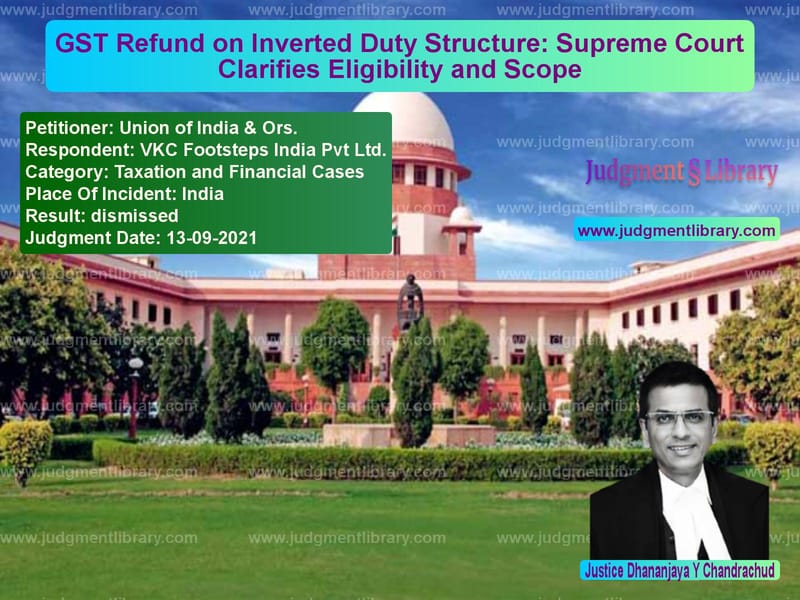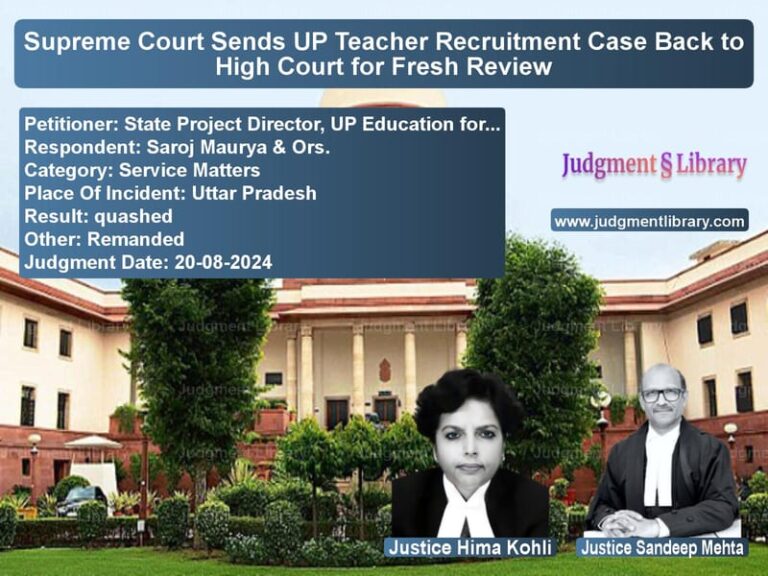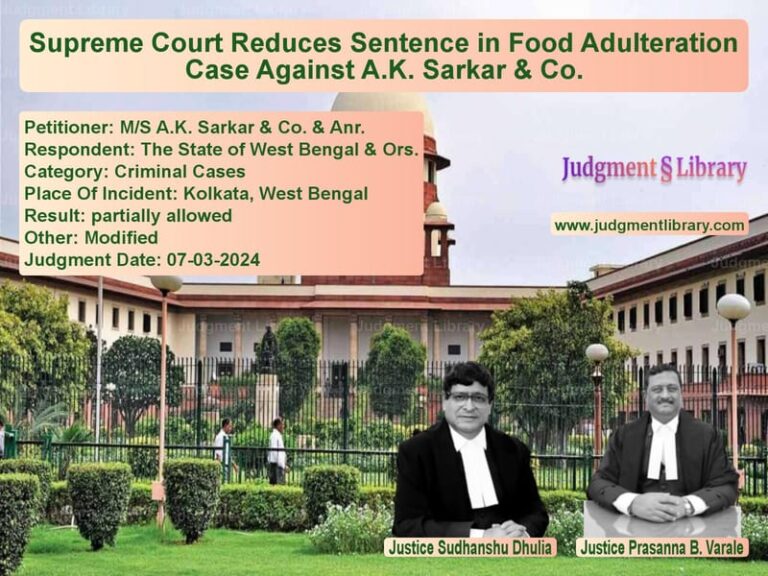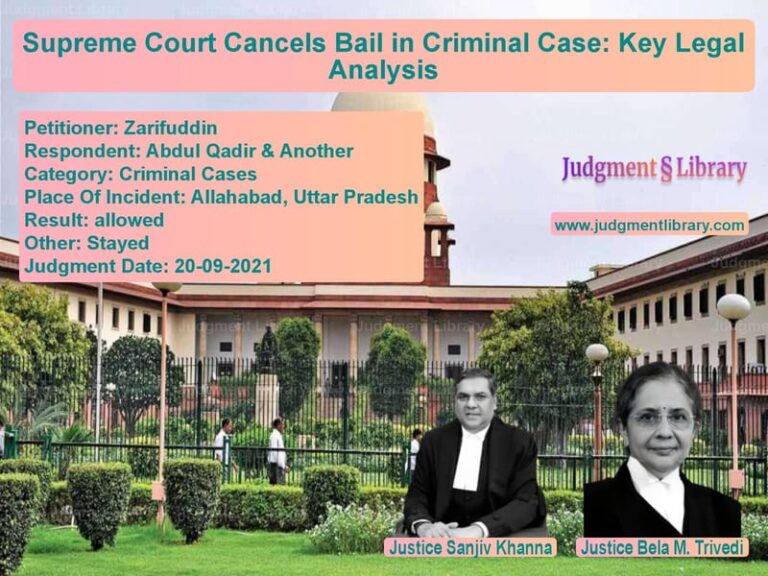GST Refund on Inverted Duty Structure: Supreme Court Clarifies Eligibility and Scope
The Goods and Services Tax (GST) regime in India was introduced with the objective of creating a seamless credit chain, preventing tax cascading, and ensuring smooth trade practices. One of the major provisions under the Central Goods and Services Tax (CGST) Act, 2017, pertains to the refund of unutilized input tax credit (ITC). Section 54(3) of the CGST Act allows for a refund of ITC in specific cases, such as exports and the accumulation of credit due to an inverted duty structure.
The case of Union of India & Ors. vs. VKC Footsteps India Pvt Ltd. brought forth an important legal question: Can businesses claim refunds of ITC for both input goods and input services under the inverted duty structure? The Gujarat High Court ruled in favor of VKC Footsteps India Pvt Ltd., stating that Rule 89(5) of the CGST Rules was ultra vires to the extent that it denied refunds for ITC on input services. Conversely, the Madras High Court upheld the validity of Rule 89(5), stating that the legislature was within its rights to frame such rules. This divergence in judicial opinions necessitated intervention by the Supreme Court.
Background of the Case
The inverted duty structure under GST arises when the tax rate on inputs is higher than that on the final product, leading to the accumulation of unutilized ITC. The CGST Act allows for refunds in such cases; however, Rule 89(5) of the CGST Rules restricts the refund to ITC accumulated from input goods only, thereby excluding ITC on input services.
VKC Footsteps India Pvt Ltd., a footwear manufacturer, filed a petition before the Gujarat High Court, challenging this restriction. The Gujarat High Court ruled that such a restriction was arbitrary and contrary to the objective of GST, which aims to provide seamless input credit. On the other hand, the Madras High Court ruled that the legislature had the authority to impose such restrictions, leading to conflicting interpretations of the law.
Arguments by the Petitioner (Union of India)
The Union of India contended that:
- The expression ‘inputs’ in Section 54(3)(ii) of the CGST Act refers exclusively to input goods and does not include input services.
- The GST framework distinguishes between goods and services, and refunds should be granted strictly in accordance with legislative intent.
- The government has the right to decide tax policies, including determining the scope of refunds under an inverted duty structure.
- Allowing refunds on input services would lead to revenue losses and distort the balance of the GST structure.
Arguments by the Respondent (VKC Footsteps India Pvt Ltd.)
VKC Footsteps India Pvt Ltd. argued that:
- The GST framework is based on the principle of tax neutrality, ensuring that businesses do not bear the burden of taxes accumulated at different stages of production.
- By denying ITC refunds on input services, Rule 89(5) contradicts the broader scheme of the CGST Act, which allows for the seamless flow of credit.
- There is no valid reason to distinguish between input goods and input services when both contribute to production and business operations.
- The rule imposes an unjust financial burden on businesses, particularly those operating in sectors with a high component of input services.
Supreme Court’s Analysis and Judgment
The Supreme Court thoroughly examined the provisions of the CGST Act and the arguments put forth by both parties.
On Legislative Authority and Refund Eligibility
“The right to claim a refund is not a fundamental right but a statutory right. Parliament has the authority to determine the conditions under which refunds are to be granted.”
The Court upheld the government’s right to frame policies regarding tax refunds and noted that restricting refunds to ITC on input goods does not violate any constitutional provision.
On the Validity of Rule 89(5)
“The formula prescribed in Rule 89(5) is a policy decision made in accordance with legislative intent. Courts must be cautious in interfering with such fiscal policy matters.”
The Court held that Rule 89(5) does not contradict Section 54(3) of the CGST Act. Instead, it clarifies the manner in which refunds are to be computed, making it a valid exercise of rule-making power.
On the Principle of Tax Neutrality
“The principle of tax neutrality cannot be interpreted to mean that every element of taxation must necessarily allow for a refund mechanism.”
The Court rejected the argument that denying refunds on input services disrupts the tax neutrality principle, stating that tax policies are designed to achieve broader economic objectives and not necessarily ensure refunds for every type of input tax.
Final Judgment
The Supreme Court upheld the Madras High Court’s ruling and overturned the Gujarat High Court’s decision. The Court held:
“Rule 89(5) of the CGST Rules is a valid exercise of legislative power and does not contravene Section 54(3) of the CGST Act. Refunds on unutilized ITC shall be limited to input goods only.”
Thus, the appeal by the Union of India was allowed, and the writ petition filed by VKC Footsteps India Pvt Ltd. was dismissed.
Implications of the Judgment
- Clearer Tax Policy: The judgment affirms the government’s policy-making authority in GST matters, ensuring consistency in refund provisions.
- Impact on Businesses: Companies operating in sectors with significant input service costs, such as IT and hospitality, may experience increased tax burdens as they cannot claim refunds on input service-related ITC.
- Future Legislative Amendments: The ruling highlights potential areas for legislative amendments, as industries may lobby for a policy change to include input services in the refund mechanism.
- Judicial Restraint in Taxation Matters: The decision reinforces the principle that courts should be cautious when intervening in taxation policy unless there is a clear violation of constitutional principles.
Conclusion
The Supreme Court’s ruling in the VKC Footsteps India Pvt Ltd. case provides much-needed clarity on the scope of ITC refunds under the inverted duty structure. By upholding Rule 89(5), the Court has reinforced the government’s authority to define tax refund policies. However, the judgment also raises concerns for businesses that rely heavily on input services, as they will need to absorb accumulated tax credits without the possibility of a refund. The decision sets a crucial precedent for future tax-related disputes and solidifies the principle that tax refunds are a matter of legislative policy rather than an absolute right.
Petitioner Name: Union of India & Ors..Respondent Name: VKC Footsteps India Pvt Ltd..Judgment By: Justice Dhananjaya Y Chandrachud.Place Of Incident: India.Judgment Date: 13-09-2021.
Don’t miss out on the full details! Download the complete judgment in PDF format below and gain valuable insights instantly!
Download Judgment: union-of-india-&-ors-vs-vkc-footsteps-india-supreme-court-of-india-judgment-dated-13-09-2021.pdf
Directly Download Judgment: Directly download this Judgment
See all petitions in Income Tax Disputes
See all petitions in GST Law
See all petitions in Tax Refund Disputes
See all petitions in Judgment by Dhananjaya Y Chandrachud
See all petitions in dismissed
See all petitions in supreme court of India judgments September 2021
See all petitions in 2021 judgments
See all posts in Taxation and Financial Cases Category
See all allowed petitions in Taxation and Financial Cases Category
See all Dismissed petitions in Taxation and Financial Cases Category
See all partially allowed petitions in Taxation and Financial Cases Category







